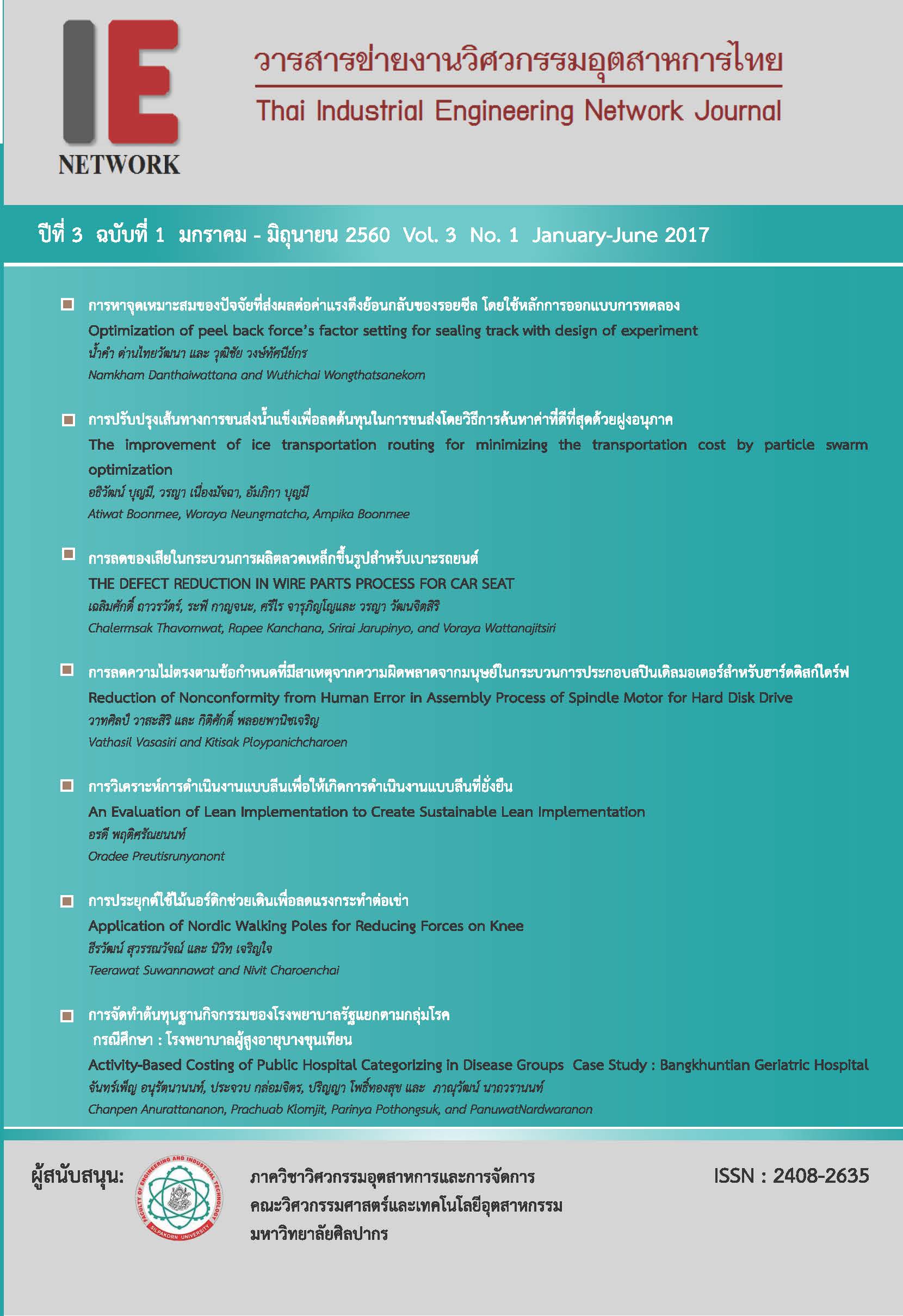An Evaluation of Lean Implementation to Create Sustainable Lean Implementation
Main Article Content
Abstract
The objective of this research is to evaluate maturity levels of Lean implementation in manufacturing companies in order to identify ways to enhance an achievement level of sustainable Lean implementation. The case studies were three manufacturing companies in the Bangkok Metropolitan Region. The Lean maturity model covering 11 strategic resources affecting success and sustainability of Lean implementation was used to evaluate the Lean maturity levels. The results showed that Company A, a large
public limited company producing watch boxes, had the highest level of Lean resources with an average resource score of 4.14. The runner-up was Company B, a lingerie producer, with an average resource score of 4.09. It was found that these two companies had high potential to implement Lean successfully and sustainably. On the other hand, Company C, a PVC tile producer, had the lowest level of Lean resources with an average resource score of 2.88, meaning that the company was at the lowest Lean maturity stage amongst the three.
Article Details
บทความ ข้อมูล เนื้อหา รูปภาพ ฯลฯ ที่ได้รับการตีพิมพ์ในวารสารฯ ถือเป็นลิขสิทธิ์ของวารสารฯ หากบุคคลหรือหน่วยงานใดต้องการนำทั้งหมดหรือส่วนหนึ่งส่วนใดไปเผยแพร่ต่อหรือเพื่อกระทำการใดๆ จะได้รับอนุญาต แต่ห้ามนำไปใช้เพื่่อประโยชน์ทางธุรกิจ และห้ามดัดแปลง
References
[2] Womack, J. P., Jones, D. T. and Roos, D. The Machine that Changed the World: Based on the Massachusetts Institute of Technology 5-million Dollar 5-Year Study on the Future of the Automobile. New York. Rawson Associates; 1990.
[3] Upton, D. Mechanisms for building and sustaining operations improvement. European Management Journal. 1996; 14: 215-28.
[4] Bateman, N. Sustainability: the Elusive Element of Process Improvement. International Journal of Operations & Production Management. 2005; 25: 261-276.
[5] Shah, R. and Ward, P. T. Lean manufacturing: context, practice bundles, and performance. Journal of Operations Management. 2003; 21:129-149.
[6] Barney, J. Firm resources and sustained competitive advantage. Journal of Management Studies. 1991; 17: 99-120.
[7] Lewis, M. A. Lean production and sustainable competitive advantage. International Journal of Operations & Production Management. 2000; 20: 959-978.
[8] Forrester, P. L., Shimizu, U. K., Soriano-Meier, H., Garza-Reyes, J. A. and Basso, L. F. C. Lean production, market share and value
creation in the agricultural machinery sector in Brazil. Journal of Manufacturing Technology Management. 2010; 21: 853 – 871.
[9] Oradee Preutisrunyanont, Chris Hicks, Tom McGovern, and Adrian Small. An analysis of the development of the capability to
implement and sustain Lean: a case study based approach, 25th Annual Australian and New Zealand Academy of Management
Conference; 2011 December 7-9; Wellington, New Zealand. 2011.
[10] ลัดดาวัลย์ เพชรโรจน์ และอัจฉรา ชา นิประศาสตร์. ระเบียบวิธีการวิจัย. กรุงเทพมหานคร: บริษัทพิมพ์ดีการพิมพ์; 2547.
[11] Golafshani, N. Understanding Reliability and Validity in Qualitative Research. The Qualitative Report. 2003; 8: 597-607.


